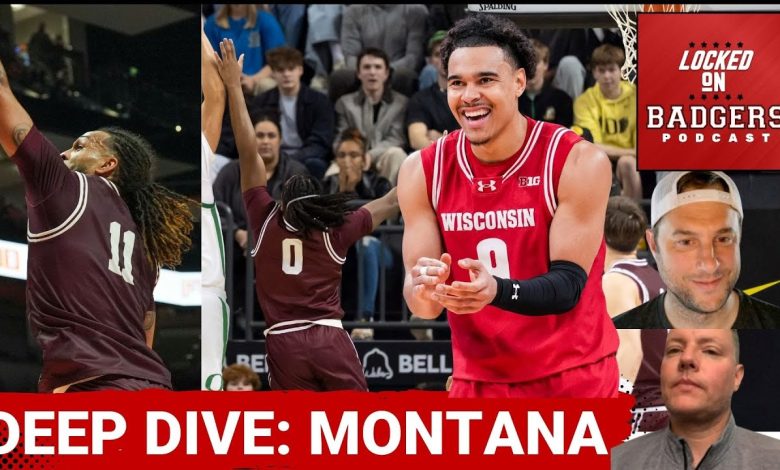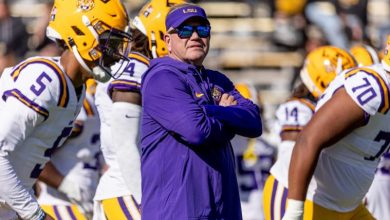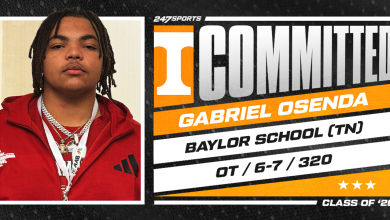MADNESS: An in-depth look at the Montana Grizzlies and their defeat against Greg Gard and the Wisconsin Badgers!

The NCAA Tournament, the pinnacle of college basketball, is an event that creates unforgettable moments, from buzzer-beaters to upsets and Cinderella stories. For the Montana Grizzlies, the 2025 NCAA Tournament was a highly anticipated opportunity to make a significant impact on the national stage. Yet, despite their valiant effort, they were ultimately overpowered by the experienced and well-coached Wisconsin Badgers, led by Greg Gard. The Grizzlies’ dreams of an upset were dashed, but their performance in the tournament was far from a disappointment. This article takes an in-depth look at the Montana Grizzlies’ journey in the tournament, their defeat at the hands of the Wisconsin Badgers, and what went wrong for them in this March Madness showdown.
Montana Grizzlies: A Strong Season Preceding the Tournament
Before we dive into the specifics of their defeat, it’s important to understand the context of the Montana Grizzlies’ season. Under the leadership of head coach Travis DeCuire, Montana had been one of the more competitive teams in the Big Sky Conference. They were known for their defensive prowess, disciplined play, and ability to control the tempo of games. The Grizzlies had the kind of gritty, blue-collar mentality that made them a tough team to face, especially in the high-stress environment of the NCAA Tournament.
Led by senior guard Josh Bannan, a versatile scorer and rebounder, Montana had a solid blend of experienced players and emerging talent. Their defense, which had been the hallmark of their success during the season, was built around physicality, toughness, and communication. Montana was a team that prided itself on slowing the game down, grinding out possessions, and imposing their will on opponents.
However, the reality of March Madness is that even the most prepared and skilled teams can face opponents that have more depth, more talent, or simply a bit more firepower. Montana’s first-round matchup against Wisconsin, a team with its own tradition of success and tough defensive play, was always going to be a challenging one.
Wisconsin Badgers: A Team Built for Tournament Success
On the other side of the court, the Wisconsin Badgers came into the tournament with a solid resume, bolstered by their deep roster, superior coaching, and methodical style of play. Greg Gard, a coach who had navigated the NCAA Tournament multiple times and had led Wisconsin to success in the past, had crafted a team that was both tough defensively and capable of executing in clutch moments.
Led by senior forward Tyler Wahl, sophomore guard Chucky Hepburn, and senior center Steven Crowl, Wisconsin had a balanced and well-rounded squad. Wahl’s leadership and versatile scoring ability, Hepburn’s clutch shot-making and playmaking, and Crowl’s presence in the post provided Wisconsin with a well-rounded attack. The Badgers’ hallmark, however, was their defense. They excelled at limiting scoring opportunities, forcing turnovers, and controlling the pace of the game. Wisconsin was built for the postseason, and they were one of the more dangerous teams in the bracket, despite not being one of the top seeds.
The Matchup: Montana Grizzlies vs. Wisconsin Badgers
As the game between the Grizzlies and the Badgers unfolded, it quickly became apparent that the two teams were well-matched defensively. Montana’s ability to slow the game down and keep it close was crucial in keeping the Badgers from running away with the game early on. The Grizzlies’ defense was disciplined, as they sought to minimize Wisconsin’s inside scoring opportunities, particularly from Steven Crowl, and force the Badgers into tough perimeter shots.
For much of the first half, Montana’s defense did its job. Wisconsin struggled to get into a rhythm offensively, often finding themselves in half-court sets against a defense that would not give up easy looks. Montana’s senior guard Josh Bannan provided the Grizzlies with an offensive spark, getting to the basket and hitting timely shots to keep the game close.
But as the game wore on, Wisconsin’s superior depth and experience began to shine through. The Badgers’ offense, which had been stagnant early on, found its flow in the second half. Chucky Hepburn, who had been quiet in the first half, began to take over. His ability to break down the defense, hit crucial mid-range shots, and create opportunities for his teammates became evident. Hepburn’s performance was pivotal in Wisconsin pulling away late in the game.
Key Moments in the Game: Turning Points
Several key moments stood out during the game, highlighting how the Badgers were able to close out the Grizzlies in the second half.
Wisconsin’s Defensive Adjustments
While Montana’s defense was solid throughout the game, Wisconsin’s defense was arguably the deciding factor. The Badgers’ ability to clamp down on Montana’s offensive possessions late in the second half disrupted the Grizzlies’ rhythm. Wisconsin’s defense stifled Montana’s scoring opportunities, especially in the paint, where the Grizzlies had been relatively effective.
Wisconsin’s defensive prowess began to show in the latter part of the game when they forced Montana into a series of turnovers. The Badgers were able to capitalize on those turnovers, turning defense into offense with fast-break opportunities. Wisconsin’s ability to score quickly in transition turned the tide in the game, allowing them to gain a comfortable lead.
Chucky Hepburn’s Clutch Performance
After a quiet first half, Chucky Hepburn emerged as the star of the game for the Badgers. His ability to step up in clutch moments was critical for Wisconsin. He scored key buckets when the Badgers needed them most, keeping Montana from getting back into the game. Hepburn’s late-game playmaking, particularly his ability to drive into the paint and either score or kick out to open shooters, was a game-changer.
In the closing minutes, Hepburn’s playmaking ability and poise under pressure were key to ensuring Wisconsin’s victory. He finished with a well-rounded stat line, contributing not only as a scorer but also as a facilitator, distributing the ball effectively to his teammates. His performance epitomized what Wisconsin is known for in March Madness—strong individual performances at critical moments that elevate the team.
The Missed Opportunities for Montana
For Montana, the game was a matter of missed opportunities. The Grizzlies had their chances to keep the game close, especially in the first half, where they managed to control the tempo and limit Wisconsin’s fast-break opportunities. However, they struggled to capitalize on crucial scoring chances. Whether it was missed free throws, turnovers, or failing to finish in the paint, Montana could not seize the opportunities that came their way.
In particular, their offense stalled in the second half when they needed it most. Josh Bannan, while an outstanding player, was forced into tough shots, and his teammates struggled to find consistency in scoring. Montana’s inability to generate enough offense to match Wisconsin’s second-half surge was the turning point in the game.
The Final Score: Wisconsin Wins 71-58
As the final buzzer sounded, Wisconsin emerged with a 71-58 victory. The Badgers’ superior defense and timely offense proved to be too much for the Grizzlies, who had fought hard but ultimately came up short. Wisconsin’s experience and depth were evident in the closing minutes, as they closed out the game with a strong defensive stand and crucial baskets from their stars.
For the Montana Grizzlies, it was a tough loss, but one that should not overshadow their achievements during the season. They had given the Badgers a tough fight and had executed their game plan well for most of the contest. Montana’s defensive discipline and resilience were on display, but they were ultimately undone by Wisconsin’s ability to execute when it mattered most.
What’s Next for Montana: Building for the Future
While the loss to Wisconsin was disappointing for Montana, the future remains bright for the Grizzlies. With head coach Travis DeCuire at the helm, Montana has established itself as a competitive program in the Big Sky Conference. Players like Josh Bannan and others will look to leave their mark on the program, and with continued development, Montana could find itself back in the NCAA Tournament in the coming years.
Montana’s defense-first mentality and their ability to compete with top-tier teams in March Madness are signs that the program is heading in the right direction. The Grizzlies’ experience in the tournament will be valuable moving forward, and they can take pride in the way they represented their program on the national stage.









